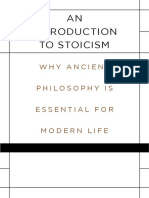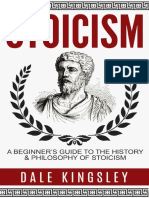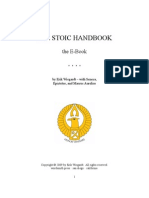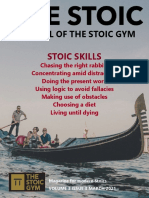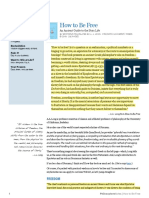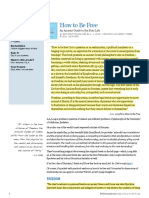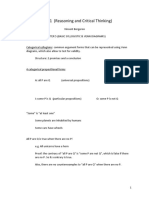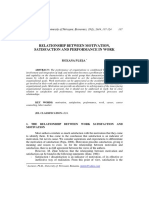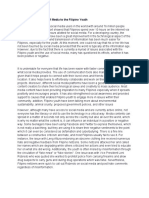Professional Documents
Culture Documents
The Practicing Stoic
The Practicing Stoic
Uploaded by
beznajaveCopyright
Available Formats
Share this document
Did you find this document useful?
Is this content inappropriate?
Report this DocumentCopyright:
Available Formats
The Practicing Stoic
The Practicing Stoic
Uploaded by
beznajaveCopyright:
Available Formats
Brian Johnson’s
PhilosophersNotes
TM
More Wisdom in Less Time
THE BIG IDEAS The Practicing Stoic
Judgment
A Philosophical User’s Manual
Principle #1 of practical Stoicism. BY WARD FARNSWORTH · DAVID R GODINE © 2018 · 260 PAGES
Virtue
The good life vs. the good mood.
What Others Think
Ignore it. “The body of ideas known as Stoicism contains some of the finest and most durable
wisdom of any age. The Stoics were deep students of fear, status, emotion, and
Preferred Indifferents
Committed but not attached. much else that bedeviled the human race thousands of years ago and bedevils it
Adversity still. They were philosophers of a down-to-earth sort, seeking by force of their
As fuel for our Optimizing. insights to free ordinary people from their sufferings and illusions. The Stoics
had their limitations, of course; they held some beliefs that very few people do
anymore. But in other ways they were far ahead of their times. They said a number
of the best things that anyone ever has.
The teachings of the Stoics are as interesting and valuable now as when first
written—maybe more so, since the passage of two millennia has confirmed so
much of what they said. The idiocies, miseries, and other discouragements of our
era tend to seem novel or modern; hearing them described in a classical dialogue
reminds us that they are nothing new. That itself was a claim of the Stoics: that
the stories and problems of humanity don’t change, but just put on new masks.
The same can be said for the remedies. The most productive advice anyone offers
nowadays, casually or in a bestseller, often amounts to a restatement of something
the Stoics said with more economy, intelligence, and wit long ago. The reader does
better by going straight to the sages.”
~ Ward Farnsworth from The Practicing Stoic
“To put the point differently,
the Stoics, when speaking
I got this book after our team was trading messages with Donald Robertson—author of The
Philosophy of Cognitive Behavior Therapy and How to Think Like a Roman Emperor.
in the manner shown here,
will sometimes be found to We were setting up an interview and he mentioned an event on Modern Stoicism he was
arrive at the same summit producing. One of the speakers at that event was Massimo Pigliucci. Really enjoyed his great
as the followers of other book How to Be a Stoic. Another speaker was William B. Irvine. Love him and his books. (See
philosophical or spiritual Notes on A Guide to the Good Life and The Stoic Challenge.) Another prospective speaker
traditions, but they go up the
was Ryan Holiday. Of course, love Ryan and our collection of Notes on *his* great books: The
Obstacle Is the Way, Ego Is the Enemy, The Daily Stoic, and Stillness Is the Key.
mountain by a different face.
Their way will be congenial to And... Another speaker was Ward Farnsworth. The name rang a vague bell. I Amazoned him and
many modern readers. It is found this book. Of course, got it. And, here we are.
the path of logic, reflection, As you probably know by this stage, I’m a big fan of (and aspiring practitioner of!) of Stoicism.
and knowledge of humanity.” You’d think I’d get a little tired of reading books on Stoicism after creating quite a few Notes
~ Ward Farnsworth on the subject but the wisdom simply never gets old. It’s curiously inspiring and rewarding to
study Seneca and Epictetus and Aurelius from slightly different perspectives—providing an
opportunity to deepen my understanding of the subject while getting more clarity on how to best
integrate their wisdom into my own life and into our evolving Optimize approach.
In fact, my love of ceaselessly immersing myself in Stoic (and all) wisdom makes me think of
1 PhilosophersNotes | The Practicing Stoic
Aurelius who told us: “Your mind will be like its habitual thoughts; for the soul becomes dyed
with the color of its thoughts. Soak it then in such trains of thoughts as, for example: Where life
is possible at all, a right life is possible.”
Back to Ward Farnsworth. He’s the Dean of the University of Texas School of Law. As you can
imagine, he brings a logical precision to his discussion of Stoicism that is distinct and powerful.
(Seriously. It’s actually ASTONISHINGLY powerful.) I really enjoyed the book and I highly
“If Stoics are distinguished
recommend it for the aspiring Practicing Stoic. (Get a copy here.)
by one policy as an everyday
matter, it is a refusal to Of course, it’s PACKED with Big Ideas and ancient Stoic wisdom we can apply to our modern
worry about things beyond lives. I’m excited to share some of my favorites, so let’s jump straight in.
their control or to otherwise
get worked up about them.” JUDGMENT: THE FIRST PRINCIPLE OF PRACTICAL STOICISM
~ Ward Farnsworth “The first principle of practical Stoicism is this: we don’t react to events; we react to our
judgments about them, and the judgments are up to us. We will see the Stoics develop that idea
in the pages to come, but this expression of it is typical:
If any external thing causes you distress, it is not the thing itself that troubles you, but
your own judgment about it. And this you have the power to eliminate right now. - Marcus
Aurelius, Meditations
The Stoic claim, in other words, is that our pleasures, griefs, desires and fears all involve three
stages rather than two: not just an event and a reaction, but an event, then a judgment or
opinion about it, and then a reaction (to the judgment or opinion). Our task is to notice the
middle step, to understand its frequent irrationality, and to control it through the patient use of
reason. This chapter starts with noticing. Later chapters will talk about the irrationality and offer
advice about control. We begin here because the point is foundational. Most of the rest of what
the Stoics say depends on it. Soon we will hear from them about ‘externals,’ desires, virtues, and
much else. But it all begins with the idea that we construct our experience of the world through
our beliefs, opinions, and thinking about it—in a word, through our judgments—and they are up
to us.”
Welcome to the first words of Chapter #1.
The #1 most important, foundational distinction of Stoicism?
It’s that THIRD step.
We need to know (!) that our reactions to life are not determined by events. Influenced, yes.
Determined? No.
There aren’t just two steps: EVENT —> REACTION.
There are THREE steps: EVENT <— JUDGMENT —> REACTION.
“The trouble with fear, first,
This is why Marcus Aurelius says: “If any external thing causes you distress, it is not the thing
is that it multiplies our
itself that troubles you, but your own judgment about it. And this you have the power to
problems. If something will
eliminate right now.”
be bad when it arrives later,
we increase its effects when And why Viktor Frankl (who, as we discussed in How to Be a Stoic, was deeply influenced by
we pull them into the present Stoicism) told us that our freedom exists in the GAP right between a stimulus and our response.
by fearing them. Why suffer As he would say, it’s not: STIMULUS —> RESPONSE.
twice?”
It’s STIMULUS ( — GAP — ) RESPONSE.
~ Ward Farnsworth
Really getting this idea (via thinking about it AND practicing it!) is essential to getting Stoicism
and applying its wisdom to our lives. In fact, this is why Ryan Holiday kicks off his year’s worth
of meditations in The Daily Stoic with EXACTLY the same distinction.
2 PhilosophersNotes | The Practicing Stoic
We’ve shared this passage a few times but it so perfectly captures the point we’ll soak our minds
“There is only one road to in it again: “The single most important practice in Stoic philosophy is differentiating between
happiness—let this rule be at what we can change and what we can’t. What we have influence over and what we do not. A
flight is delayed because of weather—no amount of yelling at an airline representative will end
hand morning, noon, and night:
a storm. No amount of wishing will make you taller or shorter or born in a different country.
stay detached from things
No matter how hard you try, you can’t make someone like you. And on top of that, time spent
that are not up to you.”
hurling yourself at these immovable objects is time not spent on the things we can change.
~ Epictetus
The recovery community practices something called the Serenity Prayer: ‘God, grant me the
serenity to accept the things I cannot change, the courage to change the things I can, and the
wisdom to know the difference.’ Addicts cannot change the abuse suffered in childhood. They
cannot undo the choices they have made or the hurt they have caused. But they can change
the future—through the power they have in the present moment. As Epictetus said, they can
control the choices they make right now.
The same is true for us today. If we can focus on making clear what parts of our day are
within our control and what parts are not, we will not only be happier, we will have a distinct
advantage over other people who fail to realize they are fighting an unwinnable battle.”
Here’s to stepping in between stimulus and response. And choosing our Optimal response.
Moment to moment to moment. TODAY.
VIRTUE: THE GOOD LIFE VS. THE GOOD MOOD
“Stoics regard virtue as sufficient to produce happiness on all occasions, and also as necessary
for it. The happiness centrally valued by the Stoic is eudaimonia, or well-being—the good life
rather than the good mood. But the Stoic believes that virtue gives rise to joy and to peace of
mind as well. Virtue produces these good consequences as side effects. The primary mission of
the Stoics, in other words, is to be helpful to others and serve the greater good, and they don’t
do this to make themselves happy. They do it because it is the right and natural way to live. But
doing it in that spirit, as it turns out, makes them happy.”
That passage is from page 208 in chapter #11 on “Virtue.”
(Note: I might have started here after scanning the table of contents. :)
We’ve discussed this basic theme MANY (many many!) times.
“It suggests that the Stoic
(Note: I promise to continue the deliberate repetition.)
tries to respond to events in a
manner similar to what would We’ve talked about Aristotle’s summum bonum and the distinction between hedonic happiness
be expected of anyone after
vs. eudaimonic happiness (see Notes on his Nicomachean Ethics). And... Martin Seligman’s
ideas around (and books on) Authentic Happiness vs. Flourish. And... Ed Deci’s distinctions
long experience with them—the
around intrinsic motivation vs. extrinsic motivation (see Notes on Why We Do What We Do).
kind of response you might
have after encountering the And... I just LOVE (!) this distinction: “The good life” vs. “the good mood.”
occasion for it a thousand <- YES!! That’s what we’re talking about.
times. The result is not an
For the Stoics, that good life is achieved via a commitment to VIRTUE. The joy that follows? It’s
uncaring or unfeeling attitude,
just a by-product of doing our best to be helpful to others as we serve the greater good.
though it will probably not
involve much emotion. It is As Ward says: “The Stoics emphasize, though, that in their view virtue is not pursued for the
the posture of a veteran.” sake of the good consequences it brings. Those consequences are welcomed and prized, but
nevertheless are incidental.”
~ Ward Farnsworth
Here’s to the good life. And the eudaimonic joy that tends to follow in the wake of our
commitment to Optimizing in service to something bigger than ourselves.
PhilosophersNotes | The Practicing Stoic 3
WHAT OTHERS THINK (& DO)
“Who are these people whose “The first rule of this branch of Stoic teaching is contempt for conformity, for the opinion of
admiration you seek? Aren’t the majority, for the habit of looking to others when thinking about what to prefer and how to
they the ones you are used act. The problem runs deep. A large share of what most people say, think, and do is a product
to describing as mad? Well, of convention. Its force is hard to resist because getting in line with what others expect causes
then, is that what you want—
them to think well of us. Deviating from it tends to be punished swiftly by others who are more
comfortable saying, doing, and enforcing what is expected. Much of Stoicism is the effort to see
to be admired by lunatics?”
the truth and act on it, and to learn a noble contempt for the consequences that follow.”
~ Epictetus
Welcome to the first words of chapter #7 on “What Others Think.”
Each of the first twelve chapters deals with a different facet of Stoicism.
These include: Judgment, Externals, Perspective, Death, Desire, Wealth and Pleasure, Valuation,
Emotion, Adversity, Virtue and Learning.
Ward provides his insightful introduction to the theme then brings his I’m-the-Dean-of-a-Law-
School logically precise (and concise!) commentary on a collection of excerpts on the chapter’s
themes from various ancient Stoics (along with some thoughts from “Stoic descendents” like
Montaigne and Schopenhauer).
It’s INCREDIBLY DENSELY PACKED with wisdom. As in, insert emoji of your brain exploding
in the best possible way. This chapter is particularly good. A couple of the ways Ward tells us
Stoics dealt with criticism is via humility and humor. Here are a couple fun examples:
Epictetus: “If you hear that someone has spoken ill of you, do not make excuses about what was
said, but answer: ‘Evidently he didn’t know about my other faults, or he wouldn’t have spoken
only of the ones he did.’”
Seneca: “And this thing we call an insult—what is it? They make jokes about my bald head, my
weak eyes, my thin legs, my height. How is it an insult to be told what is obvious?” (Hah.)
On a higher level, we are encouraged to disregard both the applause and the criticism of the
masses. AND... To be mindful of when we’re mindlessly following the herd and conforming.
My dear friend Pilar Gerasimo wrote a whole book on this theme. Check out our Notes on
Healthy Deviant: A Rule Breaker’s Guide to Being Healthy in an Unhealthy World. Pilar tells
us that a mere 1% of us are truly healthy and defines a “Healthy Deviant” as “any person who
“It is the mark of a great willingly defies unhealthy norms and conventions in order to achieve a high level of vitality,
mind to rise above insults; resilience, and autonomy.”
the most humiliating kind She also tells us: “In Let Us Now Praise Famous Men, James Agee wrote: “‘Adjustment’ to a sick
of revenge is to treat your and insane environment is of itself not ‘health’ but sickness and insanity.” That is so true, and it
adversary as not worth taking sounds a lot like that Jiddu Krishnamurti quote I shared at this book’s outset: It is no measure
revenge upon. Many have taken of health to be well-adjusted to a profoundly sick society.”
slight injuries too deeply 150 years ago, my dear philosophical great-great+++ grandfather Ralph Waldo Emerson wrote
to heart in the course of an essay on this theme called Self-Reliance. Check out those Notes and remember: “What I must
punishing them. The great and do is all that concerns me, not what the people think. This rule, equally arduous in actual and
noble are those who, like a in intellectual life, may serve for the whole distinction between greatness and meanness. It is
lordly beast, listen unmoved the harder, because you will always find those who think they know what your duty is better
to the barking of little dogs.” than you know it. It is easy in the world to live after the world’s opinion; it is easy in solitude
to live after our own; but the great man is he who in the midst of the crowd keeps with perfect
~ Seneca
sweetness the independence of solitude.”
Then there’s Mark Twain’s playful wisdom. Recall: “Whenever you find yourself on the side of
the majority, it is time to pause and reflect.”
4 PhilosophersNotes | The Practicing Stoic
“All provocations given by PREFERRED INDIFFERENTS
unthinking people—and it is “What is the difference between a preferred indifferent and the desires that Stoics regard
only from the unthinking that as hazardous? Detachment. ... An attachment to an external causes one’s happiness, and
they can come—should be equilibrium, to depend on it. The Stoic tries to avoid that position under all circumstances. But
ignored, and the insults and money, if held without attachment, is unobjectionable—for the money isn’t the problem. The
honors of the crowd should point is the health of the mind.
both be valued the same. We The word ‘detachment’ risks creating the wrong impression, since it can connote a lack of real
must not be pained by the interest in whatever is the subject of it. That isn’t the idea. Detachment refers more to the way in
one or rejoice over the other; which something is held and to whether the mind has been given over to it in an excessive way.
otherwise—whether from fear The detachment of the Stoic thus can be viewed as a kind of moderation—that is, moderation in
of insults or disgust with one’s relationship to externals. A good way to test such a relationship, and to know whether you
them—we will neglect many have an attachment to a thing or just a preference about it, is to consider how well you would
things.” handle its loss.”
~ Marcus Aurelius Welcome to the chapter on “Wealth and Pleasure.” As we just discussed, the only thing the Stoic
who is aspiring to be an “Ideal Sage” or “Wise Person” ULTIMATELY cares about is VIRTUE.
They are “indifferent” to anything outside that.
And... We can have what they describe as “preferred indifferents.” Of course, we’d prefer to have
wealth and health rather than poverty and sickness. BUT... We’d be wise to make sure we don’t
get too attached to those things as we remember our ULTIMATE aim and game—which (echo!)
is to live with virtue. RIGHT NOW.
Ward quotes Seneca to make the point: “As a favorable wind, sweeping him on, gladdens the
sailor, as a bright day and a sunny spot in the midst of winter and cold give cheer, just so
riches have their influence on the wise man and bring him joy. And besides, who among wise
men—I mean those of our school—deny that even those things we call ‘indifferent’ do have some
inherent value, and that some are more desirable than others? To some of them we accord a
little honor, to others much. So make no mistake—riches are among the ones more desirable.”
“Whatever is implanted and
(Important note: Ward also tells us: “Stoics view wealth not as an absolute state, but as
inborn can be reduced with
a favorable relationship between what one has and what one wants. Most people devote
practice but not overcome.
themselves to enlarging the first when they would do better to reduce the second.”)
Some of those who appear in
public most often will break We also talk about this in our Notes on How to Think Like a Roman Emperor. Here’s how
into a sweat, just as if they Donald Robertson puts it: “Marcus makes it clear that his internal goal is to live with virtue,
particularly wisdom and justice, but his external aim, his preferred outcome, is the common
were tired and overheated;
welfare of mankind (not just of Roman subjects, incidentally). Although the outcome is
some tremble in the knees
ultimately indifferent to Stoics, it’s precisely the action of pursuing the common good that
when they are about to give a
constitutes the virtue of justice.”
speech; in some cases teeth
chatter, tongues falter, lips P.S. My Yoda Phil Stutz and I have discussed this basic idea of being engaged yet not attached
quiver. Neither training nor many times. I think he provides a nice frame to the challenge.
experience will ever get rid of In short, he tells us that we want to be ALL IN committed as we go after whatever we’ve wisely
these things. Rather, Nature decided is a noble goal. Yet, at the same time, we want to remain completely NOT attached to the
is exerting its strength to outcome of actually getting it. Obviously, easier said than done.
admonish even the strongest
He says we need to be “Committed to BEING committed.” We’re committed to being in the game
among us—each through his and doing our best RIGHT. THIS. SECOND.
particular flaws.”
Stepping back to our ultimate game, that means we’re committed to flipping the switch and
~ Seneca
showing up as the Optimize = Optimus = Best = Eudaimon = Hero version of ourselves while
remembering the #1 rule for creating heroic emotional stamina: The worse we feel, the more
committed we are to our protocol.
PhilosophersNotes | The Practicing Stoic 5
ADVERSITY
“Those only are happy (I “Stoics avoid adversity in the ways that anyone of sense would. But sometimes it comes
thought) who have their regardless, and then the Stoic goal is to see the adversity rightly and not let one’s peace of mind
minds fixed on some object be destroyed by its arrival. Indeed, the aim of the Stoic is something more: to accept reversal
other than their own without shock and to make it grist for the creation of greater things. Nobody wants hardship in
happiness; on the happiness any particular case, but it is a necessary element in the formation of worthy people and worthy
of others, on the improvement achievements that, in the long run, we do want. Stoics seek the value in whatever happens.”
of mankind, even on some art Welcome to chapter #10 on “Adversity” in which we’re introduced to an armamentarium of Stoic
or pursuit, followed not as a wisdom-tools we can use as we face the inevitable obstacles in our lives.
means, but as itself an ideal
One of my favorites is the idea of “Hermes’ magic wand.” Ward quotes Epictetus who tells us:
end. Aiming thus at something
“This is Hermes’ magic wand: touch it to anything you like, they say, and the wand will turn it
else, they find happiness by
to gold. Not so; bring anything you like, rather, and I’ll make it something good. Bring disease,
the way.” bring death, bring poverty, bring insults, bring punishment for high crimes—all these things
~ John Stuart Mill will be made beneficial by Hermes’ magic wand.”
Immediately after that passage, Ward shares the Marcus Aurelius wisdom that Ryan Holiday
used as the inspiration for his book The Obstacle Is the Way: “The mind turns around every
hindrance to its activity and converts it to further its purpose. The impediment to action
becomes part of the action; the obstacle in our way becomes the way forward.”
As I read that passage and reflected on the fact that some adversity is NECESSARY for our
growth, I thought of this wisdom from Robert Emmons and his great book Thanks!: “Not only
does the experience of tragedy give us an exceptional opportunity for growth, but some sort
of suffering is also necessary for a person to achieve maximal psychological growth. In his
study of self-actualizers, the paragons of mental wellness, the famed humanistic psychologist
Abraham Maslow noted that ‘the most important learning lessons... were tragedies, deaths,
and trauma... which forced change in the life-outlook of the person and consequently in
everything that he did.’”
So... Facing any adversity, my beloved Hero? Let’s wave Hermes’ wand, alchemize it into another
opportunity to practice our philosophy as we give ourselves most fully to the world. TODAY.
Brian Johnson,
Philosopher in Residence
If you liked this Note, About the Author of “The Practicing Stoic”
you’ll probably like… WARD FARNSWORTH
How to Be a Stoic
Ward Farnsworth is Dean of the University of Texas School of Law. His prior
How to Think Like a books include the highly regarded Farnsworth’s Classical English Metaphor and
Roman Emperor
Farnsworth’s Classical English Rhetoric, both published by Godine.
The Daily Stoic
The Stoic Challenge
About the Author of This Note
BRIAN JOHNSON
Brian Johnson loves helping people optimize their lives so they can actualize
their potential as he studies, embodies and teaches the fundamentals of optimal
living—integrating ancient wisdom + modern science + practical tools. Learn
more and optimize your life at optimize.me.
6 PhilosophersNotes | The Practicing Stoic
You might also like
- The Stoic Challenge - William B. IrvineDocument67 pagesThe Stoic Challenge - William B. IrvineColón Rivera100% (3)
- Stoic WisdomDocument248 pagesStoic WisdomFayaz Ahmad Mallagori90% (10)
- How To Be A Stoic: Ancient Wisdom For Modern Living - Western Philosophy: Ancient, To C 500Document5 pagesHow To Be A Stoic: Ancient Wisdom For Modern Living - Western Philosophy: Ancient, To C 500lifijuty17% (6)
- The Concise Meditations of Marcus Aurelius by Robin HomerDocument19 pagesThe Concise Meditations of Marcus Aurelius by Robin HomerRobin Homer100% (10)
- A Guide - To - Stoic - Living - Keith SeddonDocument196 pagesA Guide - To - Stoic - Living - Keith Seddonstrayl1ght100% (10)
- Daily Stoic An Introduction To StoicismDocument10 pagesDaily Stoic An Introduction To StoicismSimon85% (13)
- A Guide To The Good Life PDFDocument6 pagesA Guide To The Good Life PDFArina Catalina87% (15)
- The Inner Citadel: The Meditations of Marcus AureliusDocument11 pagesThe Inner Citadel: The Meditations of Marcus AureliusLauryn19% (16)
- KC - Concept of PhilosophyDocument15 pagesKC - Concept of PhilosophyToshi Bharat100% (1)
- The Obstacle Is The Way: The Ancient Art of Turning Adversity To Advantage - MacroeconomicsDocument5 pagesThe Obstacle Is The Way: The Ancient Art of Turning Adversity To Advantage - Macroeconomicstomulocu9% (11)
- Self and Others - CourseraDocument3 pagesSelf and Others - Courserarurban manipurNo ratings yet
- The Stoic 9 Principles To Help You Keep Calm in ChaosDocument5 pagesThe Stoic 9 Principles To Help You Keep Calm in Chaostruepatriot1992100% (1)
- Stoicism - A Beginner's Guide To The History & Philosophy of Stoicism (PDFDrive)Document66 pagesStoicism - A Beginner's Guide To The History & Philosophy of Stoicism (PDFDrive)ceriasaki100% (1)
- Think Like Stoic Course GuidebookDocument192 pagesThink Like Stoic Course Guidebooktahsali100% (7)
- Sherman StoicWarsDocument257 pagesSherman StoicWarsRyan Adkinson100% (6)
- The Daily Stoic 366 Meditations On Wisdo PDFDocument6 pagesThe Daily Stoic 366 Meditations On Wisdo PDFYik3% (30)
- The Willpower InstinctDocument6 pagesThe Willpower Instinctmatache vali0% (1)
- The Path of StoaDocument75 pagesThe Path of StoaRich008775% (4)
- An Introduction To Stoicism: Day 2Document14 pagesAn Introduction To Stoicism: Day 2Duarte Harris Cruz100% (1)
- The Stoic ChallengeDocument6 pagesThe Stoic ChallengeddebusNo ratings yet
- The Philosophy of Cognitive Behavioural Therapy (Summary)Document6 pagesThe Philosophy of Cognitive Behavioural Therapy (Summary)KoreyNo ratings yet
- THE Stoic Reading List: THE Best of & Where To StartDocument11 pagesTHE Stoic Reading List: THE Best of & Where To StartgastonNo ratings yet
- Stoicism: Tips and Routines to Help You Live the People’s PhilosophyFrom EverandStoicism: Tips and Routines to Help You Live the People’s PhilosophyRating: 5 out of 5 stars5/5 (6)
- Stoicism - Ultimate Handbook To - Thomas Beckett PDFDocument188 pagesStoicism - Ultimate Handbook To - Thomas Beckett PDFknshk67% (3)
- Art of Stoic Perception PDFDocument61 pagesArt of Stoic Perception PDFFarhad Tavassoli100% (2)
- THE STOIC June2020 PDFDocument24 pagesTHE STOIC June2020 PDFJérôme RobinNo ratings yet
- Stoic HandbookDocument24 pagesStoic HandbookRazvan Kxkxk100% (1)
- Daily Stoic The Stoic Reading List.01Document11 pagesDaily Stoic The Stoic Reading List.01Jim93% (14)
- Daily Stoic Morning Ritual.01Document6 pagesDaily Stoic Morning Ritual.01SirLouen96% (28)
- Practical StoicismDocument66 pagesPractical StoicismEmil Lucian100% (4)
- Daily Stoic Amor Fati Excerpt From The Obstacle Is The WayDocument7 pagesDaily Stoic Amor Fati Excerpt From The Obstacle Is The WaySirLouen90% (10)
- Stillness Is The Key: An Ancient Strategy For Modern Life - Management & Management TechniquesDocument4 pagesStillness Is The Key: An Ancient Strategy For Modern Life - Management & Management Techniquesbexazeho0% (8)
- Stoic Week 2017 HandbookDocument37 pagesStoic Week 2017 HandbookJoe100% (2)
- Stoicism WilliamIrvine A Guide To The Good Life PDFDocument6 pagesStoicism WilliamIrvine A Guide To The Good Life PDFnocturne.noire4920100% (3)
- StoicWeek2021 ModernStoicismDocument141 pagesStoicWeek2021 ModernStoicismDouglasAkioNo ratings yet
- Stoic Therapy ToolkitDocument6 pagesStoic Therapy ToolkitKamizori100% (9)
- 20 Stoic Exercises PDFDocument24 pages20 Stoic Exercises PDFAura Sky100% (4)
- Meditations (Concise Summary)Document24 pagesMeditations (Concise Summary)jACKaSSS123100% (2)
- 15 Books That Will Change Your Life: That Most People Have Never Heard ofDocument8 pages15 Books That Will Change Your Life: That Most People Have Never Heard ofalex100% (1)
- The Enchiridion - EpictetusDocument26 pagesThe Enchiridion - Epictetuspoetictouch100% (4)
- Guide To Marcus Aurelius and StoicismDocument21 pagesGuide To Marcus Aurelius and Stoicismdjole100% (2)
- Think On These Things PDFDocument6 pagesThink On These Things PDFmatache valiNo ratings yet
- Beyond Theory, An Old and New Stoic PracticumDocument47 pagesBeyond Theory, An Old and New Stoic Practicumdonlockwood100% (1)
- On The Shortness of Life (PDFDrive)Document114 pagesOn The Shortness of Life (PDFDrive)Đan Trân TrầnNo ratings yet
- M. Aurelius PDFDocument366 pagesM. Aurelius PDFDobre Mihai100% (9)
- The Spirit of Stoic Serenity 00 IntroductionDocument4 pagesThe Spirit of Stoic Serenity 00 Introductionmichel.dawNo ratings yet
- How To Be Invincible in Life - A Stoic Guide On Indifference - The Stoic SageDocument15 pagesHow To Be Invincible in Life - A Stoic Guide On Indifference - The Stoic Sagethomas_matheusNo ratings yet
- Stoicism and ChristianityDocument9 pagesStoicism and Christianitypcthompson8535100% (2)
- 20 Stoic Exercises: For Impressive Self-ImprovementDocument22 pages20 Stoic Exercises: For Impressive Self-ImprovementDJSeidel100% (2)
- The Obstacle Is The WayDocument6 pagesThe Obstacle Is The WayAMKNo ratings yet
- How To Keep A Stoic Journal For Self-Improvement - The Stoic SageDocument16 pagesHow To Keep A Stoic Journal For Self-Improvement - The Stoic Sagethomas_matheusNo ratings yet
- Letters From A Stoic PDFDocument6 pagesLetters From A Stoic PDFmatache valiNo ratings yet
- 22 Stoic Truth From Marcus AureliusDocument27 pages22 Stoic Truth From Marcus AureliussejinmaNo ratings yet
- The StoicDocument22 pagesThe StoicStanley Baker100% (1)
- Daily Stoic Interviews With Two Stoic Scholars.01Document16 pagesDaily Stoic Interviews With Two Stoic Scholars.01SirLouen100% (1)
- Stoic Week 2016 Handbook Stoicism TodayDocument51 pagesStoic Week 2016 Handbook Stoicism Todayrasklad1No ratings yet
- The Obstacle Is The WayDocument15 pagesThe Obstacle Is The WayYahya Krami SenhajiNo ratings yet
- The 4 Disciplines of ExecutionDocument6 pagesThe 4 Disciplines of ExecutionTim JoyceNo ratings yet
- Coach. Heal. Motivate.: Coach the mind, heal the body, and motivate the spirit!From EverandCoach. Heal. Motivate.: Coach the mind, heal the body, and motivate the spirit!No ratings yet
- The Stoic Art of Not Giving a F*ck Every Day: 101 Timeless Mini-Meditations on Wisdom, Happiness, and Living a Good LifeFrom EverandThe Stoic Art of Not Giving a F*ck Every Day: 101 Timeless Mini-Meditations on Wisdom, Happiness, and Living a Good LifeRating: 5 out of 5 stars5/5 (3)
- How To Be Free: The Big IdeasDocument6 pagesHow To Be Free: The Big IdeasbeznajaveNo ratings yet
- How To Be Free: The Big IdeasDocument6 pagesHow To Be Free: The Big IdeasbeznajaveNo ratings yet
- Meditations: The Big IdeasDocument6 pagesMeditations: The Big IdeasbeznajaveNo ratings yet
- How To Be Free: The Big IdeasDocument6 pagesHow To Be Free: The Big IdeasbeznajaveNo ratings yet
- Corporate CultureDocument1 pageCorporate CulturebeznajaveNo ratings yet
- Modifying The Astra H Flip Key For The Astra GDocument6 pagesModifying The Astra H Flip Key For The Astra GbeznajaveNo ratings yet
- Modifying The Astra H Flip Key For The Astra GDocument6 pagesModifying The Astra H Flip Key For The Astra GbeznajaveNo ratings yet
- Sajjad HussainDocument2 pagesSajjad HussainAli AamirNo ratings yet
- Organization Development and Reinventing The Organization: 1 Slide 1Document38 pagesOrganization Development and Reinventing The Organization: 1 Slide 1Snehal Sunil Darji100% (1)
- A3. Applying Cognitive Science in MalaysiaDocument3 pagesA3. Applying Cognitive Science in MalaysiaSharifah Nurul SyukrinaNo ratings yet
- 06.2 - Methods of Data CollectionDocument6 pages06.2 - Methods of Data CollectionRichard BacharNo ratings yet
- E9q3 Slht1 LopezDocument12 pagesE9q3 Slht1 LopezFaith Castillo-EchavezNo ratings yet
- PHI1101 Class Notes (Chapter 5)Document11 pagesPHI1101 Class Notes (Chapter 5)meghabhatia03No ratings yet
- Plesa 2 PDFDocument8 pagesPlesa 2 PDFLarissa D. DanciNo ratings yet
- Soc Sci 121-Pag Unawa Sa Sarli Understanding The Self: Arlyn R. Dimaano, LPT Instructor I Mindoro State UniversityDocument30 pagesSoc Sci 121-Pag Unawa Sa Sarli Understanding The Self: Arlyn R. Dimaano, LPT Instructor I Mindoro State UniversityDaniel PedrazaNo ratings yet
- Johari WindowDocument21 pagesJohari WindowtawandaNo ratings yet
- Task 1 Interrelatedness of Education With Other Disciplines: Name & SectionDocument10 pagesTask 1 Interrelatedness of Education With Other Disciplines: Name & SectionPaul Simon RamonolosNo ratings yet
- Phenomenology Vs EthnomethodologyDocument2 pagesPhenomenology Vs EthnomethodologyMargarito EscalanteNo ratings yet
- Gambetta Were They Pushed or Did They Jump Individual Decision Mechanisms in Education Studies in Rationality and Social ChangeDocument243 pagesGambetta Were They Pushed or Did They Jump Individual Decision Mechanisms in Education Studies in Rationality and Social Changewalbornoz_the_one7472No ratings yet
- Alejo Rambac Fitness CupDocument2 pagesAlejo Rambac Fitness Cupandrei cabacunganNo ratings yet
- Information LiteracyDocument10 pagesInformation LiteracyJeremy Bautista SorianoNo ratings yet
- RES Earch 2: First QuarterDocument9 pagesRES Earch 2: First QuarterAlexah QuezonNo ratings yet
- CH 5Document5 pagesCH 5Asim IkramNo ratings yet
- Other Perspective On Pereboom's Four-Case Argument'Document14 pagesOther Perspective On Pereboom's Four-Case Argument'白秀玲No ratings yet
- Londoño Et Al. Propuesta de Un ModeloDocument14 pagesLondoño Et Al. Propuesta de Un ModeloFernando HernandezNo ratings yet
- 11 Jaeger Final VersionDocument19 pages11 Jaeger Final VersionJuan Trujillo MendezNo ratings yet
- Frederick Herzberg Motivational TheoryDocument11 pagesFrederick Herzberg Motivational TheorySASIDHARAN MURUGANNo ratings yet
- Evaluation and Effects of Media To The Filipino YouthDocument2 pagesEvaluation and Effects of Media To The Filipino YouthSami100% (1)
- WaveDocument2 pagesWavemoses bandickNo ratings yet
- Konsep Stoisisme Untuk Mengatasi Emosi Negatif Menurut Henry ManampiringDocument6 pagesKonsep Stoisisme Untuk Mengatasi Emosi Negatif Menurut Henry ManampiringRahma RumaruNo ratings yet
- Privacy ManagementDocument14 pagesPrivacy ManagementArdi HandayatNo ratings yet
- Module 3 4TH QTRDocument8 pagesModule 3 4TH QTRMyca BeramoNo ratings yet
- Artificial Intelligence (AI) Impact On Digital Marketing ResearchDocument10 pagesArtificial Intelligence (AI) Impact On Digital Marketing ResearchAli Reza JafariNo ratings yet
- M1: Lecture Notes (Narrative) : Different Philosophical Views of Self SOCRATES (Greek Philosopher)Document4 pagesM1: Lecture Notes (Narrative) : Different Philosophical Views of Self SOCRATES (Greek Philosopher)JenChu LiChaengNo ratings yet
- Oral Communication Finals ReviewerDocument5 pagesOral Communication Finals ReviewerSamuel CarandangNo ratings yet





